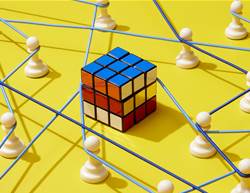What’s the name of that actress? You know, the wacky blonde who’s in that show at the fancy hotel? Julia, Jane, Joan...”
If you’re in the stage we delicately call “midlife,” you may be nodding in recognition. Scientists sometimes refer to this—when you can’t quite remember a name or word that used to be easy to retrieve—as the “tip-of-the-tongue phenomenon.”
As you get older, these brain blips can happen more and more often, along with things like misplacing your phone three times in one day and opening the pantry door only to completely forget what you needed. (By the way, the answers to the above mysteries are Jennifer Coolidge, on the shelf next to the toilet, and paprika.)
We jokingly call these blips “senior moments,” but behind the self-deprecating humour there may be a slight shiver of dread: Is this normal aging, or is it an early sign of dementia?
With more than 400,000 Australians currently living with Alzheimer’s (a number that’s expected to nearly double in the next few decades as the population ages), this is not an unreasonable fear.
But—deep breath—most of these slips are perfectly harmless, and in fact there are many things other than dementia (things you can actually change and improve!) that could be putting a damper on your memory. Here’s what’s likely going on and what you can do about it.
The incredible shrinking brain
First, let’s make it clear—if Jennifer Coolidge used to be your favourite actress but now her name doesn’t ring a bell, that would be reason for concern. But if you remembered the name as soon as you read it, or if another name you couldn’t come up with suddenly pops into your head as you’re brushing your teeth an hour later, you’re probably just fine.
Here’s why: after growing at a furious pace for the first couple of decades of your life, your brain reverses course and starts to shrink when you hit your 30s and 40s, says neuropsychologist Dr Elise Caccappolo.
“When you’re a child, your brain is constantly creating new neural connections, and by age 25, it should be fully developed,” she says. About a decade after that, in a very natural process, it slowly starts to lose volume and brain cells start dying off.
The first part of the brain to start shrinking is the frontal lobe. “This is where we house our short-term or working memory, sort of a scratch pad for the brain,” says brain health researcher Dr Murali Doraiswamy.
Newly learned names, dates we haven’t yet put on the calendar, and the location of our keys all get temporarily deposited here before being transferred to long-term memory.
“You’re less likely to have age-related memory loss for well-rehearsed information such as directions to familiar places, how to use familiar gadgets, or the name of a school you went to,” Dr Doraiswamy adds.
Slower brain but more wisdom?
Dr Caccappolo explains that this volume loss also affects processing speed. “This is why it may take a minute longer to come up with a name or a word, or it may take longer to solve a problem,” she says, stressing that you still can do these things—you just do them at a slower pace.
Another reason your brain may not be quite as quick when you’re in your 50s or 60s: you have a lot going on as you balance young-adult children, aging parents, work, and home life, says Dr Thomas Holland, a physician scientist at the Rush Institute for Healthy Aging in the US.
“I have misplaced or lost a fair number of sunglasses throughout my life just because I have been distracted,” he notes. “That being said, from a normal cognitive age perspective, we are generally going to see a bit of decline in our cognitive abilities as we get into our older years.”
The flip side of slower processing and weaker short-term memory is that as you age you develop a larger reserve of wisdom, says geropsychologist Dr Brenna Renn.
“The longer you live, the more facts you’ve built up, and that sort of intelligence tends to stay pretty well preserved and actually improves with age.”
It’s still important to know which kinds of memory changes are in fact worrisome signs. But the key thing to recognise about the normal shifts that come with aging is that “you can live your life as you always have, you can function independently, and it doesn’t affect what you do on a daily basis,” Dr Caccappolo explains.
Memory-zapping lifestyle issues
The brain is part of a vast interconnected system of organs, and the way you treat your body is reflected in how well your brain works.
If you’re concerned about memory, your first step should be a head-to-toe wellness check. Infections such as UTIs can cause brain fog, especially in elderly people; plus, whatever is good for the heart is good for the brain.
Keeping blood vessels clear and blood flowing freely helps maximise the oxygen and nutrients flowing to and nourishing the brain. Exercising, quitting smoking, maintaining a stable weight, and working with your health team to manage chronic conditions such as diabetes will keep your brain healthier too.
Ask yourself these six questions to see if your lifestyle may be causing foggy moments.

1. What medications am I on?
It’s crucial to go over your list of meds with your doctor, since many common drugs can affect cognition and memory; if you take several, they may be interacting with one another.
Tell your GP of all medications you take, even over-the-counter medications or supplements.
Your doctor may be able to suggest alternatives, or the two of you can weigh the importance of certain drugs against how the side effects change your quality of life.
2. Am I depressed or anxious?
Depression and anxiety are the biggest culprits in forgetfulness for people in their 40s, 50s, and 60s, says Dr Caccappolo.
“Depression takes up a lot of real estate in your brain,” she explains. “When you’re depressed, your brain is not working at 100%. It’s not paying attention to things as well as it usually does, and the memory areas are not doing what they usually do, such as encoding and consolidating information.”
Dr Holland adds that stress itself is a low-level chronic inflammatory state. “If you’re constantly under stress, your body is always in a state of readiness, dumping hormones into your blood that can keep you on edge,” he says.
In the long term, unregulated inflammation can cause cellular damage across the body, he says, “and if that’s happening in the brain, we’re potentially going to see declines in cognitive function.”
According to a report by researchers at Harvard Medical School, people who are depressed typically experience more brain shrinkage, have worse recollection, and are better than non-depressed people at retrieving bad memories but worse at retrieving good ones. And feeling as if your memory is slipping can make you feel more depressed or anxious, perpetuating the cycle.
If mental health and mood may be responsible for your brain blips, speak with a professional about talk therapy and/or medication, which may help improve your attention, concentration, and other thinking abilities, says Dr Renn.
3. Am I eating a healthy diet?
What you eat can have a big influence on your brain, says Dr Holland. “If you’re eating foods that provide the appropriate nutrients, they can help prevent damage to the neurons,” he says.
In a study Dr Holland and his colleagues published in the journal Neurology, they found that a diet filled with foods rich in flavonoids (such as dark leafy greens, tea, and tomatoes) was associated with slower rates of brain decline.
A plant-forward diet can also reduce the build-up of plaque in blood vessels, which is crucial because when blood vessels are clogged, your risk of small strokes increases, and over time those can lead to vascular dementia.
“A brain-healthy diet, such as the Mediterranean diet or an Indian vegetarian curry diet, can reduce the risk for blockages of blood vessels, thus ensuring healthy brain circulation,” says Dr Doraiswamy.
He also recommends a diet rich in B vitamins and antioxidants to protect membranes from damage.
4. Am I getting enough sleep?
In midlife, you could be missing out on restorative sleep for a number of reasons, including menopause symptoms or the stress of dealing with young-adult children, elderly parents, or your job. Exhaustion can deplete your resources, including your ability to remember or learn new things.
Untreated obstructive sleep apnoea can be a major contributor to brain issues, says Caccappolo.
People with sleep apnoea “are having multiple hypoxic events each night when they’re not getting oxygen to the brain, which can lead to memory problems”.
A review in the journal Sleep Medicine found that attention, working memory, episodic memory, and executive function were decreased in people with sleep apnoea.
If you’re having trouble sleeping, first try improving your sleep habits by cutting out caffeine later in the day, eating lighter meals in the evening, and keeping your bedroom dark and cool.
If these changes don’t work, check with your doctor or a sleep specialist to assess whether you have sleep apnoea—treatment could help restore your sleep and your memory.
For sleep disturbances due to symptoms of menopause, ask your doctor if menopausal hormone therapy is right for you.
5. Do I need a hearing aid?
An intriguing new line of research has shown a connection between hearing loss and brain health. Hearing loss may interfere with mental processes because it means the brain has to use many of its resources just to understand speech; hearing aids can help by making the information clearer as it enters the brain.
Currently, about one in six Australians experience hearing loss. Our risk of hearing loss increases as we age.
In a recent review from Singapore, the use of hearing aids was associated with a 19% decrease in the risk of long-term cognitive decline.
“Having properly working hearing aids can go a long way toward boosting and preserving someone’s cognition,” says Dr Renn.
If you notice (or family members comment) that your hearing is not what it used to be, see an audiologist.
6. Am I trying to do everything all at once?
Recent research suggests that multitasking—say, trying to straighten up the living room while taking a work call—could be detrimental to memory.
A study in Nature found that media multitasking in particular (using several devices at once) was associated with attention lapses and decreased the ability to encode new memories. And that was in young people.
For older people, multitasking may be even more detrimental, says Dr Caccappolo. “As our processing speed gets slower, we’re slower overall when it comes to both thinking and moving,” she adds. “If you’re trying to do two or three things at the same time, you’re going to be a little bit slower at each one.”
If you’re concerned about your memory, consider getting tested: Dementia Australia provides a free, self-assessment task.
“When people have brain blips, they may automatically worry that it’s Alzheimer’s, but there are many reasons for these changes that can be addressed,” says brain researcher Audette Rackley.
“It’s so important to ask, ‘How can I be creating more brain-healthy rhythms in my life?’ Just a small shift in the right direction can make an impact over time.”
When memory loss is a cause for concern
While it’s comforting to know that blips are usually nothing to be worried about, we have to face the fact that as we age, our risk of dementia does increase.
And then there’s the grey area known as mild cognitive impairment (MCI). This is when you have more cognitive issues than is typical for your age but you haven't yet developed dementia.
“Not everybody with MCI will go on to have dementia, but some people will,” says Dr Renn. “MCI is often a warning sign that there might be some changes that are a bit more insidious.”
“We start to be concerned about MCI when you can’t retain new memories,” says Dr Caccappolo. This might mean forgetting something someone told you 10 minutes ago or asking the same question over and over again.
Additional signs of mild cognitive impairment include:
- Having trouble following directions.
- Forgetting how to do something you’ve done many times before, like make coffee.
- Getting lost going to a familiar place.
Dr Holland says that “stepwise” memory loss is also a red flag. “If you’re always losing your keys, that’s less concerning than if you always lose your keys but now you also can’t remember how to get home,” he says.
The experts point out that it is often a partner, a close friend, or a relative who notices these changes before a person with mild cognitive impairment does.
Brain blips that are normal with aging
- Forgetting to pay a bill.
- Forgetting a name but remembering it later.
- Slipping over a word or two.
- Misplacing your keys or your phone.
- Getting lost but finding your way via a map or GPS.
Signs of something more serious
- Forgetting to pay many bills each month.
- Forgetting that you know someone.
- Difficulty following a conversation.
- Losing things and being unable to track them down.
- Entirely forgetting how to get home.
Remember that everyone reacts differently to memory loss. It's normal to feel worried, frustrated or embarrassed but don't let it get to you. By following these pointers, and talking with the relevant medical professions, you'll become sharper, happier and more confident in no time.









